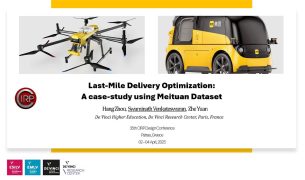At ESILV, the Research Track engages students and faculty in interdisciplinary research, applied studies, and academic dissemination across engineering, data science, cybersecurity, finance, AI, and more.
The variety and depth of topics addressed within the Research Track reflect the richness of academic inquiry at ESILV. This program is a distinctive element of the school’s educational approach, offering students a structured path to engage in applied and interdisciplinary research. Highlighting the outcomes of these efforts, through official school channels and individual recognition, reinforces the value of research in engineering education. It also helps foster a collective identity around academic excellence, making these achievements more visible within and beyond the institution.
The following overview highlights recent contributions from students, alumni, and researchers involved in the Research Track, demonstrating the diversity and depth of current initiatives.
Research Publications and Conferences at ESILV
Cybersecurity & AI in Malware Detection
Students Foucauld Estignard, Adrien Djebar, and Hugo Deduit published a paper in the Lecture Notes in Computer Science series for the CRiSIS conference.
Their work “Relevance of Imaged-Based Representation for Android Malware Detection“, introduces the Median Color Proximity (MCP) metric for Android malware detection through bytecode image representation.
The research, based on a dataset of 29,555 APK files, demonstrates how visual patterns correlate with malicious behaviors using UMAP clustering techniques.
Information Retrieval Optimization
Under faculty supervision, Maxime Hanus and Quentin Guignard presented their first academic paper at the CORIA 2025 conference.
Their model, UC-FIRe, proposes an efficient, unsupervised approach to information retrieval that improves BM25 results without additional computational cost.
Their method leverages FastText embeddings and lexical clustering to enhance search relevance across BEIR corpora.
Financial Engineering Research
Portfolio Optimization and Credit Spread Risk
Jean-Gabriel Attal presented an enhanced Markowitz model adapted to multi-asset portfolios, addressing the limitations of classic equity-based allocations. Maxime Segal discussed Credit Spread Risk under new regulatory frameworks, emphasizing the need for stress testing and decoupling from interest rate risk in banking books.
Thematic Research Seminars
Artificial Intelligence
Nédra Mellouli traced the history of AI from automata to deep learning and explored its ethical and societal implications. Gaël Marec, PhD candidate, discussed fake news detection using knowledge graphs and image tracking technologies.
Cybersecurity
Anaïs Moussouni explored unsupervised learning and forensic techniques for ransomware attribution, focusing on system artifacts and anonymized environments. Mike Da Silva from Airbus Protect examined the convergence of safety and cybersecurity in critical systems.
Generative AI and Aerospace Engineering
Laurène Vaugrante shared insights on the societal impact of generative AI and differences in research systems across Europe. Clément Caillaud introduced research on turbulence transition in hypersonic flight using combined numerical simulations and wind tunnel experiments. Health, Environment, and Industry Applications
Food and Energy Systems
Steven Duret (INRAE) and Pascal Clain (ESILV) assessed the food cold chain from health, waste, and energy perspectives and presented new freezing technologies based on gas hydrates.
Deep Learning Applications
Reihan Mazouz (Atos CIFRE) presented radar signal detection in electronic warfare through AI. Nzamba Bignoumba (TalTech) showcased the use of deep learning to detect adverse medical events in longitudinal health data.
Healthcare Robotics and Industrial Research
Damien Chablat (Centrale Nantes) introduced a surgical assistant robot for endoscopic procedures. Nicolas Museux (Thales) discussed the role of symbolic AI in critical systems and encouraged reflection on the environmental cost of AI.
Applied Mathematics and Digital Simulation
Error Estimation and Environmental Modelling
Jad Dabaghi shared numerical methods for simulating complex physical systems and evaluating error components in environmental models, contributing to simulation efficiency and accuracy.
Digital Manufacturing in Dentistry
Nicolas Lebon presented results on dental prosthetics milling via CAD/CAM, identifying key performance indicators for surface integrity based on tool geometry and materials.
Career Paths in Research
Corporate Research and Innovation
Sarah Roual and Xavier Brouty provided perspectives on industrial research careers in quantitative finance and acoustic signal processing.
Johann Meulemans (Saint-Gobain) discussed gaps between building design and actual energy performance and presented tools to assess thermal performance under climate change scenarios.
A Research Track Rooted in Real-World Impact
The ESILV Research Track bridges academic inquiry with real-world challenges, promoting collaboration between students, faculty, and industry experts. Through publications, seminars, and applied research, the program nurtures the next generation of engineers and researchers in sectors as diverse as cybersecurity, healthcare, finance, and energy.






















